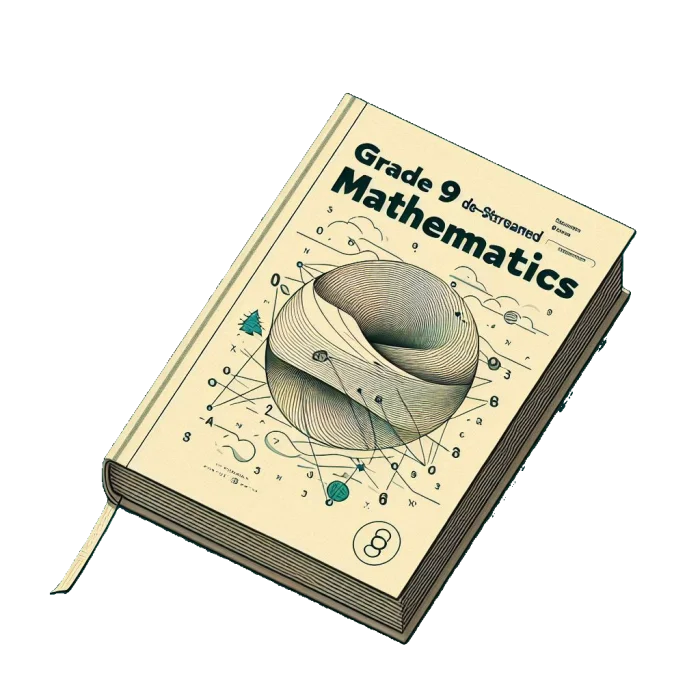This course enables students to consolidate, and continue to develop, an understanding of mathematical concepts related to number sense and operations, algebra, measurement, geometry, data, probability, and financial literacy. Students will use mathematical processes, mathematical modelling, and coding to make sense of the mathematics they are learning and to apply their understanding to culturally responsive and relevant real-world situations. Students will continue to enhance their mathematical reasoning skills, including proportional reasoning, spatial reasoning, and algebraic reasoning, as they solve problems and communicate their thinking.
COURSES DETAILS
Type
De-streamed
Credit Value
1.0
Curriculum Policy
https://assets-us-01.kc-usercontent.com/fbd574c4-da36-0066-a0c5-849ffb2de96e/3f76051d-897c-45f4-bc9b-86bc3934b6b9/The%20Ontario%20Curriculum%20-%20Mathematics%20Grade%209%20De-streamed%20Course%202021_with%20Teacher%20Supports.pdf
Principles Underlying the Grade 9 Mathematics Curriculum
- A mathematics curriculum is most effective when it values and honours the diversity that exists among students and within communities.
The Grade 9 mathematics curriculum is based on the belief that all students can and deserve to be successful in mathematics. In particular, an inclusive curriculum is built on the understanding that not all students necessarily learn mathematics in the same way, use the same resources (e.g., tools and materials), or learn within the same time frames. Setting high academic expectations and building a safe and inclusive community of learners requires the purposeful use of a variety of instructional and assessment strategies and approaches that build on students’ prior learning and experiences, and create an optimal and equitable environment for mathematics learning. The curriculum emphasizes the need to eliminate systemic barriers and to serve students belonging to groups that have been historically disadvantaged and underserved in mathematics education. - A robust mathematics curriculum is essential for ensuring that all students reach their full potential.
The Grade 9 mathematics curriculum challenges all students by including learning expectations that build on students’ prior knowledge and experience; involve higher-order thinking skills; and require students to make connections between their lived experiences, mathematical concepts, other subject areas, and situations outside of school. This learning enables all students to gain a powerful knowledge of the usefulness of the discipline and an appreciation of the histories and importance of mathematics. - A mathematics curriculum provides all students with the fundamental mathematics concepts and foundational skills they require to become capable and confident mathematics learners.
The Grade 9 mathematics curriculum provides a balanced approach to the teaching and learning of mathematics. It is based on the belief that all students learn mathematics most effectively when they can build on prior knowledge to develop a solid understanding of the concepts and skills in mathematics, and when they are given opportunities to apply these concepts and skills as they solve increasingly complex tasks and investigate mathematical ideas, applications, and situations in everyday contexts. As students continue to explore the relevance of mathematics, they further develop their identity and agency as capable mathematics learners. - A progressive mathematics curriculum includes the strategic integration of technology to support and enhance the learning and doing of mathematics.
The Grade 9 mathematics curriculum strategically integrates the use of appropriate technologies to support all students in developing conceptual understanding and procedural fluency, while recognizing the continuing importance of students’ mastering the fundamentals of mathematics. For some students, assistive technology also provides an essential means of accessing the mathematics curriculum and demonstrating their learning. Students develop the ability to select appropriate tools and strategies to perform particular tasks, to investigate ideas, and to solve problems. The curriculum sets out a framework for learning important skills, such as problem solving, coding, and modelling, as well as opportunities to develop critical data literacy, information literacy, and financial literacy skills. - A mathematics curriculum acknowledges that the learning of mathematics is a dynamic, gradual, and continuous process, with each stage building on the last.
The Grade 9 mathematics curriculum is dynamic, continuous, and coherent and is designed to support all students in developing an understanding of the interconnected nature of mathematics. Students come to understand how concepts develop and how they build on one another. As students communicate their reasoning and findings, they move towards new understandings. Teachers observe and listen to all students and then responsively shape instruction in ways that foster and deepen student understanding of important mathematics. The fundamental concepts, skills, and processes introduced in the elementary grades support students in extending their learning in the secondary grades. - A mathematics curriculum is integrated with the world beyond the classroom.
The Grade 9 mathematics curriculum provides opportunities for all students to investigate and experience mathematical situations they might find outside the classroom and develop an appreciation for the beauty and wide-reaching nature and importance of mathematics. The overall curriculum integrates and balances concept development and skill development, including social-emotional learning skills, as well as the use of mathematical processes and real-life applications. - A mathematics curriculum motivates students to learn and to become lifelong learners.
The Grade 9 mathematics curriculum is brought to life in the classroom, where students develop mathematical understanding and are given opportunities to connect their knowledge and skills to wider contexts and other disciplines. Making connections to the world around them stimulates their interest and motivates them to become lifelong learners with healthy attitudes towards mathematics. Teachers bring the mathematics curriculum to life using their knowledge of:- the mathematics curriculum;
- the backgrounds and identities of all students, including their past and ongoing experiences with mathematics and their learning strengths and needs;
- mathematical concepts and skills, and the ways in which they are connected across the strands, other grades, other disciplines, and the world outside the classroom;
- instructional approaches and assessment strategies best suited to meet the learning needs of each student;
- resources designed to support and enhance the achievement of and engagement with the curriculum expectations, while fostering an appreciation for and joy in mathematics learning.

